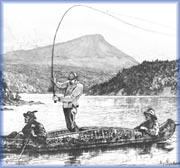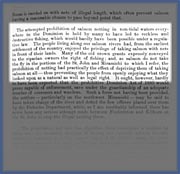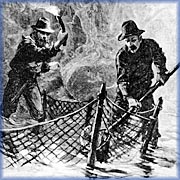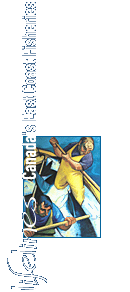|
The angling aristocracy seeks to enforce a code
which benefits both the salmon stocks and their own interests.
 he British, Canadian and,
especially, the American sportsmen were generally welcomed to the
rivers of New Brunswick by the government and the local population.
They brought money and employment to regions of the province sorely
in need of both and were willing to pay top dollar for grants of
land with fishing rights. Sensing a bonanza, the provincial
government enacted legislation in 1884 which leased choice fishing
waters on all ungranted Crown Land at auction and specified that
only the rod and reel could be used as a method of harvest. he British, Canadian and,
especially, the American sportsmen were generally welcomed to the
rivers of New Brunswick by the government and the local population.
They brought money and employment to regions of the province sorely
in need of both and were willing to pay top dollar for grants of
land with fishing rights. Sensing a bonanza, the provincial
government enacted legislation in 1884 which leased choice fishing
waters on all ungranted Crown Land at auction and specified that
only the rod and reel could be used as a method of harvest.
|

|

The First Cast,
from an etching signed "H.E. Sandham", probably mid-1880s, from The
Ristigouche and Its Salmon Fishing, Edinburgh, 1888
(New Brunswick Museum)
|
|
This was the problem. By encouraging both the federal and
provincial governments to protect the salmon resource through
such instruments as closed fishing seasons, private wardens and
fish hatcheries, the traditional methods of harvest, spearing and
netting, were strictly policed. While the concerns of
conservationists were served by this policy, a source of livelihood
for aboriginals and settlers was actively discouraged. Resentment
soon grew.
|

|

Excerpt from the 1896 report of the Provincial
Fishery Commissioner
in which the effects of federal legislation on netting are examined.
From Journals of the House of Assembly of the Province of New
Brunswick, Fredericton, 1897
(New Brunswick Museum)
|

|

Emptying Salmon Nets by Torchlight,
from a wood engraving signed "Karst" in Picturesque Canada, The Country As
It Was and Is, George Munro Grant, ed., Toronto, 1882
(New Brunswick Museum)
|
|



